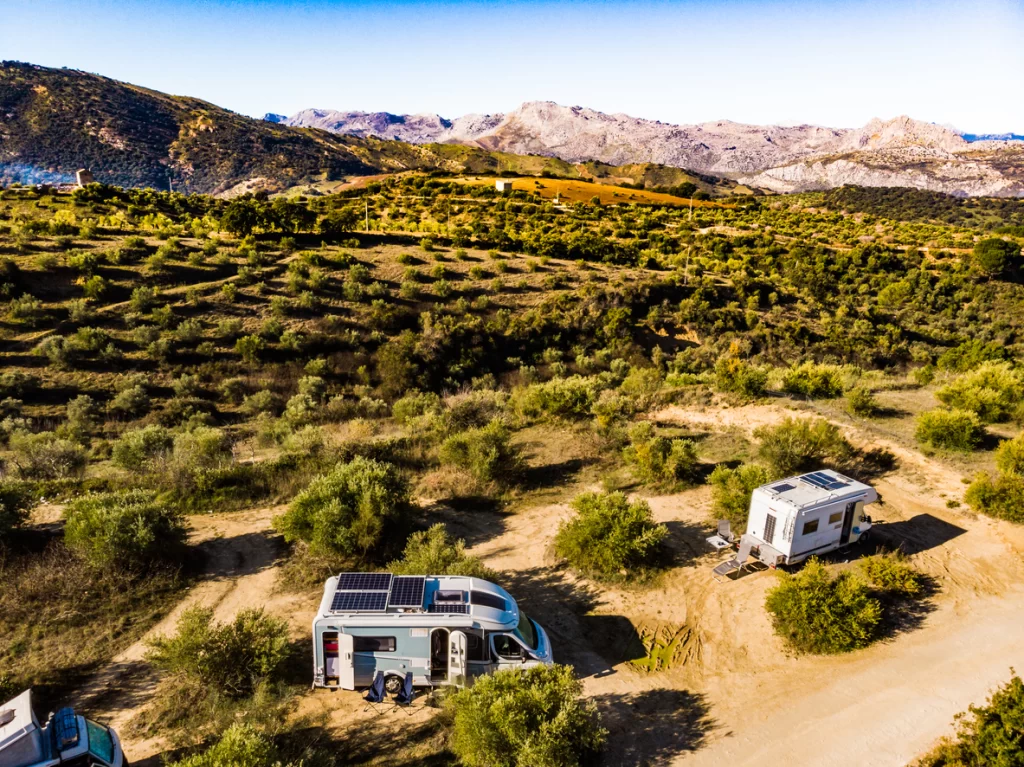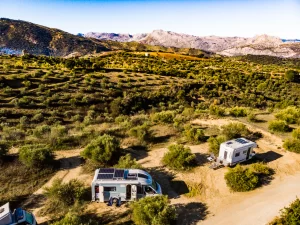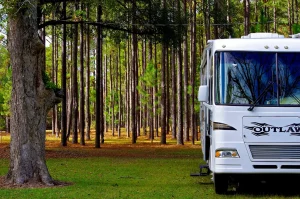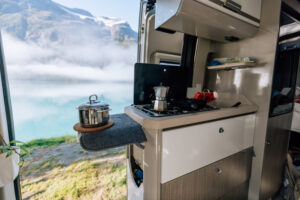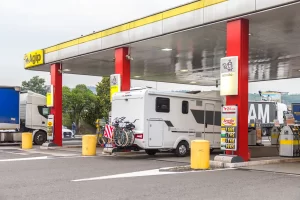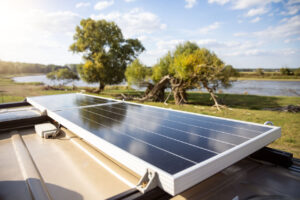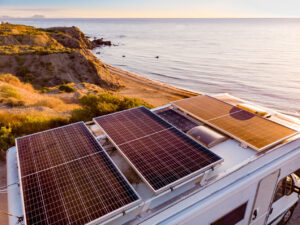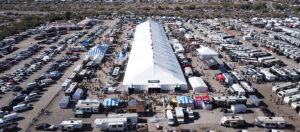Boondocking, also known as dry camping or off-the-grid living, has surged in popularity as individuals seek immersive experiences in the great outdoors. Whether you’re an eco-conscious traveler, an off-grid enthusiast, or a casual RV owner, the call of the wild beckons, and with it, the quest for independence from conventional energy sources.
One of the most accessible and environmentally friendly solutions to this energy dilemma is solar power. In this comprehensive guide, we’ll walk you through the ins and outs of solar energy for boondocking, sharing invaluable strategies to keep your adventures powered by the sun.
What do we mean by Boondocking?
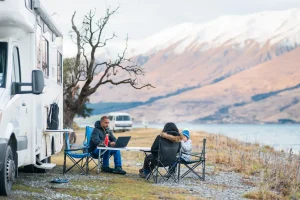
Boondocking refers to camping in remote or primitive areas without access to traditional amenities such as water, electricity, or sewage systems. Many campers and RV owners are drawn to boondocking for the sense of freedom and self-sufficiency it offers. However, living off-grid also requires careful planning and resource management, especially regarding energy.
Why Choose Solar Power?
Solar power has become increasingly popular due to its numerous advantages. First and foremost, solar energy is a clean and renewable source of electricity that produces no greenhouse gases or harmful emissions. This makes it an environmentally friendly alternative to fossil fuels that are responsible for significant air pollution and contributing to climate change.
Furthermore, solar panels have a long lifespan and require minimal maintenance, making them a cost-effective solution in the long run. They are also highly versatile, as they can be used in various environments, including remote locations, with no access to traditional sources of electricity.
How Does Solar Power Work?
Solar power converts sunlight into electricity through silicon photovoltaic (PV) cells. When sunlight hits the PV cells, an electric field generates direct current (DC) electricity. This DC electricity is converted into alternating current (AC) by an inverter, making it compatible with household appliances and electronics.
Understanding the Draw of Boondocking
Boondocking embodies the spirit of adventure and self-sufficiency. It’s about finding beauty and solace in secluded places where the only sounds are those of nature. Yet, this liberation from crowded campsites often means saying goodbye to creature comforts and amenities like electric hookups. This tradeoff is more than justifiable to many enthusiasts for its tranquility and unique experiences.
However, going off-grid doesn’t mean stepping into the dark ages. The technological advancements in solar power have made it a feasible and efficient energy source, even in the most remote locations. By harnessing the sun’s rays, boondockers can power everything from smartphones to refrigerators, allowing them to enjoy extended stays in the wilderness without compromising convenience.
Solar Power Basics for the Unplugged Adventurer
Solar power is a renewable energy source derived from the sun’s radiation. This energy can be converted into electricity or used for heating and lighting. Regarding boondocking, solar photovoltaic (PV) systems are the most practical, as they generate electricity directly.
The allure of solar power for boondocking is its eco-friendliness and virtually unlimited supply. Solar panels can last over 25 years and require minimal maintenance, making them an attractive investment for sustainable travelers. The benefits extend beyond environmental impact. With solar energy, there’s no need to lug around or restock fuel for generators, ensuring a more tranquil and carefree outdoor experience.
The Benefits of Solar Power for Boondocking
There are countless reasons why solar power is an excellent solution for off-grid living and boondocking. One of the most significant advantages is its energy efficiency, as it can provide all the necessary electricity for your RV or camping setup without relying on fossil fuels.
Solar energy systems are also noise—and emission-free, making them ideal for campgrounds with strict noise restrictions. In addition, solar panels are lightweight and portable, making them easy to set up and transport.
Moreover, with no moving parts, solar panels have a longer lifespan than other energy sources. This means fewer replacements or repairs, saving you time and money in the long run. Additionally, many states offer incentives and tax credits for using renewable energy sources like solar power, increasing its cost-effectiveness.
Maximizing Energy Efficiency in Remote Locations
To get the most out of your solar power system while boondocking, it’s essential to understand how to maximize energy efficiency. Here are a few tips to help you make the most of your solar setup:
- Choose an efficient RV or camping trailer: When shopping for an RV or camper, look for one with energy-efficient features such as LED lighting, energy-efficient appliances, and sound insulation. Reduced energy consumption means less strain on your solar panels.
- Invest in high-quality solar panels: Not all solar panels are created equal. Higher-quality panels will provide more efficient and reliable performance, especially in low-light conditions.
- Use energy-saving measures: Simple steps like turning off lights when not in use, using natural light instead of electricity, and unplugging electronics can significantly reduce energy usage.
- Monitor and regulate energy consumption: Keep track of how much energy you are using and try to stay within the limits of your solar panel capacity. Consider investing in a battery monitor to ensure optimal performance.
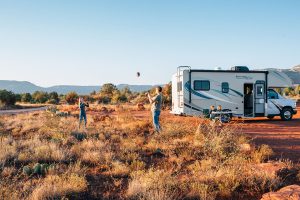
By following these tips and carefully planning your energy usage, you can stay powered up for longer while boondocking and fully enjoy the freedom and tranquility of off-grid living.
Designing an Efficient Solar System for Your Boondocking Adventures
A well-designed solar system ensures a seamless and reliable energy supply during boondocking. Here are the key considerations for creating an efficient and tailored setup.
Calculating Your Energy Needs
Before investing in solar equipment, it’s essential to understand your energy consumption. Begin by taking stock of all the devices you’ll be using, noting their power consumption in watts and the duration you’ll use them daily. This process will inform the size and capacity of your solar system, ensuring you stay supplied with power.
Some tips on reducing energy consumption include using energy-efficient appliances, turning off unnecessary devices, and setting timers for lights.
Choosing the Right Solar Panels and Equipment
The market offers a variety of solar panel options, ranging from rigid mono- or polycrystalline panels to flexible thin-film technologies. Consider factors such as space availability, weight, and durability when choosing. Efficacy, measured in watts per unit area, is also crucial as it dictates power generation under varying weather conditions.
Equipment selection continues after solar panels. Charge controllers, inverters, and wiring all play critical roles in your system’s efficiency and safety. Invest in high-quality components and ensure compatibility with your PV array for optimal performance.
Optimizing Placement and Orientation for Maximum Efficiency
Proper installation is contingent on your solar panels’ ability to capture sunlight. For optimal efficiency, panels should be positioned to face the sun’s path and tilted at an angle specific to your location. Ensuring panels are clear of shadows from trees or nearby structures is equally important. Consider using tilt and swivel mounts for added flexibility.
Understanding Charge Controllers and Inverters
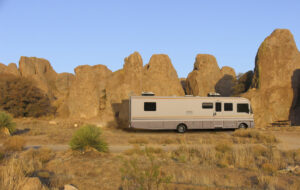
Solar charge controllers regulate the voltage and current from solar panels to your batteries, preventing overcharging. Inverters, on the other hand, convert the DC power stored in batteries to AC power used by most household appliances. Choosing these devices can be complex, as options range from PWM controllers to high-frequency inverters with advanced features like remote monitoring. Select technology based on your system requirements and budget.
Energy Storage Solutions: The Lifeblood of Off-Grid Living
Energy storage systems are key to powering your boondocking experience after sunset. Without reliable batteries, solar energy would be like a temporary power source. Select battery types that provide longevity and sustained power delivery for true independence.
Types of Batteries for Off-Grid Use
- Lead-Acid Batteries: These are the most common and affordable option, ideal for those new to boondocking. However, they have a shorter life span and lower depth of discharge compared to newer technologies.
- Gel and AGM Batteries: These variants offer spill-proof and maintenance-free operation, making them suitable for mobile applications like RVs and boats.
- Lithium-Ion (LiFePO4) Batteries: The gold standard for off-grid setups, lithium batteries are lighter, charge faster, and offer deeper discharges without affecting life expectancy. While they come at a premium, their benefits often outweigh the cost for frequent boondockers.
Choosing the right battery type depends on several factors, including upfront costs, maintenance requirements, and energy storage capacity. Properly sizing your battery bank to match your daily consumption is crucial in prolonging battery life.
Backup Power Options
While solar panels can keep you powered most days, it’s wise to have backup power sources for extended periods of cloudy weather or unforeseen circumstances. Some options include:
- Generators: These come in various sizes and fuel types, with portable options being the most convenient for off-grid use.
- Fuel Cells: These devices convert hydrogen or other fuels into electricity, making them an eco-friendly option for backup power.
Managing and Extending Battery Life
Battery life can be significantly prolonged with prudent use and proper care. Avoiding over-discharging, maintaining correct charging levels, and keeping batteries at a stable temperature can prevent premature degradation. Investing in a battery monitor will give you real-time data on your system’s health and performance, allowing you to adjust usage and charging patterns accordingly.
Regular maintenance, such as equalizing for lead-acid batteries or balancing for lithium, ensures cells within the battery are in optimal condition and function uniformly. A healthy battery bank will efficiently store and deliver your hard-earned solar power, maximizing your off-grid experience.
Tips for Maximizing Efficiency in Your Solar System
Efficiency doesn’t end with system design. Your behavior and attention play vital roles in squeezing every bit of power out of your solar setup. Here are some best practices to help you get the most out of your off-grid system.
Energy-Saving Practices
- Use Energy-Efficient Appliances: Opt for items with high Energy Star ratings that consume less power.
- Practice Conservation: Turn off lights and devices when not in use, and use power strips with switches to cut power to multiple electronics completely.
- Cook and Heat Wisely: Solar cooking can be fun and energy-efficient. For heating, select options like propane heaters for direct use rather than converting solar energy to electricity for conduction heating.
Maintenance and Troubleshooting Tips
- Keeps Panels Clean: To maintain peak performance, regularly remove dust, dirt, and debris from your solar panels.
- Check for Damage: Inspect all solar system components for wear and damage, especially after transit, to avoid unexpected failure.
- Learn to Troubleshoot: Understand the basics of your system so you can identify and resolve common issues without professional help, keeping downtime to a minimum.
A Bright Future for Boondockers
The sun is a generous provider, and with the proper planning and investment, its gifts can sustain you through a lifetime of adventures. Boondocking with solar power epitomizes sustainable living and shows that one can enjoy the beauty of nature without depleting it.
For eco-conscious travelers and off-grid enthusiasts, the transition to solar energy is not just a smart move—it’s an empowering one that enables a deeper connection with nature without sacrificing a few notable luxuries and amenities.
Check out the Leisure CW blog for more information on how to use renewable energy in your RV adventures and contact us if you would like to add solar to your RV.
